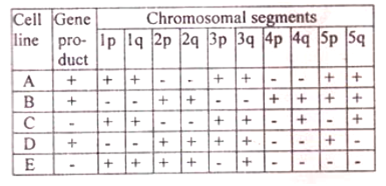 Multiple Choice Questions
Multiple Choice QuestionsWhile designing an experiment for Agrobacterium mediated plant transformation, a student noted down the following points:
A. Ti and Ri plasmids induce crown gall and hairy root disease, respectively.
B. Enzymes octopine synthase and nopaline synthase involved in the synthesis of octopine and nopaline, respectively are encoded by T-DNA.
C. All the six vir genes, vir a, vir B, vir c, vir D, vir E, and vir G are absolutely required for virulence.
D. Almost perfect 25bp direct repeat sequences flanking all Ti and Ri plasmids in the T-DNA region is essential for T-DNA transfer.
Which one of the following combinations of the above statement is correct?
A, B and C
B, C and D
A, C and D
A, B and D
The following are certain facts regarding bioremediation:
A. Biodegradable plastics are made using polyhydroxyl alkanoates (PHAs) such as polyhydroxy butyrate (PHB).
B. Pseudomonas putida F1 bacterial strain is involved in degradation of aromatic hydrocarbon.
C. The bacterium Deinococcus radiodurans consume and digest toulene and ionic mercury from highly radioactive nuclear waste.
D. Bioaugmentation is a process of improving the microorganisms already existing in the system for degradation of xenobiotic compound.
Which one of the following combination of above statements is correct?
A, B and C
A, B and D
A, C and D
B, C and D
Which one of the following statements is NOT correct for propagation and maintenance of mammalian cells in vitro?
Transformed cell lines do need external supply of serum to grow.
The cells that are obtained directly from the organism is a primary culture.
Trypsin is added to cell culture media to maintain cell's death.
HEPES buffer is generally used to maintain pH of the culture media.
Which one of the following techniques is generally used to produce transgenic animals?
Processed mRNA containing only exons are introduced into blastocyst-stage embryo.
Entire foreign nucleus is introduced in enucleated unfertilized egg.
Desired DNA is microinjected into fertilized eggs followed by implantation of embryo in a foster mother.
cDNA of desired gene is introduced into animal embryos and implanted in a foster mother.
A series of cell lines were created by fusing mouse and human somatic cells. In mouse-human somatic cell hybrids, human chromosomes tend to get lost before becoming a stable cell line. Some hybrid cell lines may carry human chromosome deletions. Each cell line was examined for the presence of chromosomes and for the production of an enzyme. The following results were obtained:

Which segment of the chromosome has the gene encoding for the enzyme?
1p
5p
5q
4p
On order to develop a vaccine against a regulatory T cell-promoting but Th1 suppressing viral infection, four groups (A - D) of mice were primed with either killed virus (A) or a virus-derived immune dominant peptide (B), or the same peptide but with substitutions (C) or were left unprimed (D). Upon infection challenge, the order of increasing severity of infection was observed to be B > A > D > C. To explain the contrasting effects of these two peptides (B) and (C), their MHC-binding affinities were assessed but no difference was found. Which of the following possibilities most likely to explain their contrasting effects?
The wild-type peptide (B) elicits T cell expansion but the mutant peptide (C) fails.
The wild-type peptide induces T cell deletion but the mutant peptide does not.
The wild-type peptide-MHC complex binds T cell receptor with significantly higher affinity than the mutant peptide-MHC complex.
The wild-type peptide induces deletion of T-Reg cells but increases IFN -γ production by T-cells, whereas the mutant peptide fails to induce these effects.
Marker-assisted selection (MAS) defined as selection based on molecular markers should have some important criterion for plant breeding activities. Some statements about these criteria are mentioned below:
A. Marker should co-segregate with the desired trait of interest.
B. Marker should not co-segregate with the desired trait of interest.
C. Marker should be un-linked with the desired trait of interest.
D. Marker is used for indirect selection of a genetic determinant or determinants of a trait of interest.
Which one of above combinations is correct?
A and B
B and C
C and D
A and D
In a transgenic mice line, lox P sites are introduced in the target gene A in the following manner

This transgenic mice line was mated with another transgenic mice line where Cre recombinase is expressed only in B cells. What will be the expression profile of gene A in Cre/lox recombinant mice?
Gene will not be expressed in B cells, as the orientation of exon 1 will be inverted by Cre.
Gene will not be expressed in B cells, as exon 2 will be deleted by Cre.
Gene will only be expressed in B cells of the recombinant mice where Cre removes the two lox P sites.
Gene will not be expressed in B cells as orientation of exon 2 will be inverted.
During the production of alcohol by fermentation using budding yeast, oxygen supply is kept limited. Why?
Budding yeasts are obligate anaerobes and cannot tolerate oxygen.
Budding yeasts lose mitochondria in the absence of oxygen.
Budding yeasts are facultative anaerobes.
Alcohol is oxidized further in the presence of oxygen.
A transgenic lettuce plant was generated by over-expressing isopentenyl transferase (IPT) gene under the control of the promoter of senescence activator gene (SAG12).
Following are some statements regarding this transgenic plant. The transgenic plants
A. exhibit delayed senescence.
B. exhibit fast senescence.
C. have a higher amount of cytokinin during senescence.
D. have a higher amount of gibberellins during senescence.
Which one of the following combinations of above statements is correct?
A and B
A and C
B and D
C and D
